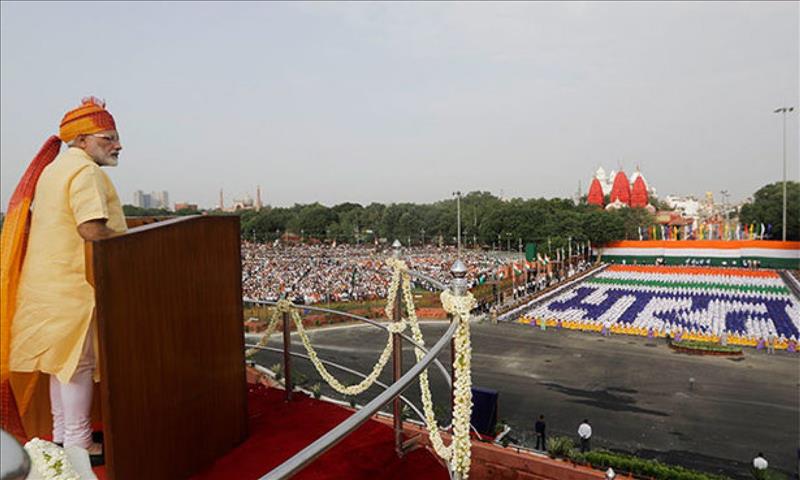
Modi's Independence Day address was disappointing
Indian Prime Minister Narendra Modi's Independence Day address on August 15 left much to be desired. It should have sounded somewhat like the annual State of the Union address by the president of the United States, but instead it sounded like a populist harangue ahead of the parliamentary election due in 2019.
Modi and his campaign manager and Bharatiya Janata Party (BJP) president Amit Shah are determined to win that election.
The DailyBrief Must-reads from across Asia - directly to your inboxThe hour-long address was interesting both for what it said and what it did not.
One would have expected Modi to open the proceedings with a foray on foreign policy, especially as regards Pakistan and China, with which India's relations have gone from bad to worse. But Modi was not perhaps confident enough to deal with the tricky subject.
On the domestic front, Modi failed to address fully the heart-rending story of the killing by official neglect of oxygen supply of more than 80 babies at an important local hospital in , a town in the populous, politically sensitive state of Uttar Pradesh, which is ruled by the BJP.
Efforts seemed under way to obfuscate the issue and escape state responsibility and accountability.
Other issues avoided by Modi in his Independence Day address included the baiting and lynching of Muslims for eating or storing beef; attacking Muslim men for marrying Hindu women and what is called "love jihad", an ugly phrase; assaulting couples for displaying affection in public; trolling or killing people with secularist views; issuing rape threats to women on social media by Hindu supremacist trolls; and so on.
The prime minister has no doubt said in public that such activities by Hindu nationalist groups are not "unacceptable", though he has failed to use his administrative authority to order prosecution and punishment of offenders under the law.
Modi also failed to denounce recent xenophobic and racist attacks on Africans in India. More than 50 African countries in April against the attacks, and called for an investigation by the United Nations Human Rights Council.
The disturbing rise of such a trend, going against the values of India's freedom struggle and offending international humanitarian norms, brought discredit to the government and defamed Indians. Modi should have suitably acknowledged and regretted it and announced remedial steps in his Independence Day address. He did not do so.
Furthermore, Modi's Independence Day address included "terminological inexactitudes" on his demonetization policy, the new goods and services tax (GST), construction of roads and railways, and violence in Kashmir.
Modi claimed that about 3 trillion rupees (US$46 billion) including black money had returned to the banking system after demonetization, this in spite of the Reserve Bank of India not yet providing official figures in this regard and the non-availability of the Parliamentary Committee Report on the subject.
On the GST, he claimed that his government had acted quickly to implement the tax, but some experts have said the policy began 17 years earlier and the BJP had stood against it while it was an opposition party.
On the claim of speedy construction of roads and railways under the present government, some experts say the credit actually goes to the previous United Progressive Alliance government (2004-14) under prime minister Manmohan Singh.
On Kashmir, despite the mass upsurge that arose in the wake of the killing of a militant youth in July 2016, Modi never visited the region to share his concerns over terrorist and counterterrorist violence. In his Independence Day address, he stated that the obsession with gali and goli (abuses and bullets) must give way to embracing the Kashmiri people in peace. However, the disconnect between the PM's speech and the ground realities is huge. The Kashmiri people are very much victims of official bullets and terrorist violence. Further, the government's militaristic approach since July 2016 has led to serious human-rights violations in Kashmir.
Modi must appreciate that violence in Kashmir has two aspects: terrorist violence and state violence. Both need to be effectively handled.
Modi's Independence Day address was in denial about the nature of the violence in Kashmir, not all of which arose from Pakistan as he seemed to believe.
He must do a rethink, visit Kashmir, and speak to the people.
Asia Times is not responsible for the opinions, facts or any media content presented by contributors. In case of abuse, .
Legal Disclaimer:
MENAFN provides the
information “as is” without warranty of any kind. We do not accept
any responsibility or liability for the accuracy, content, images,
videos, licenses, completeness, legality, or reliability of the information
contained in this article. If you have any complaints or copyright
issues related to this article, kindly contact the provider above.


















Comments
No comment